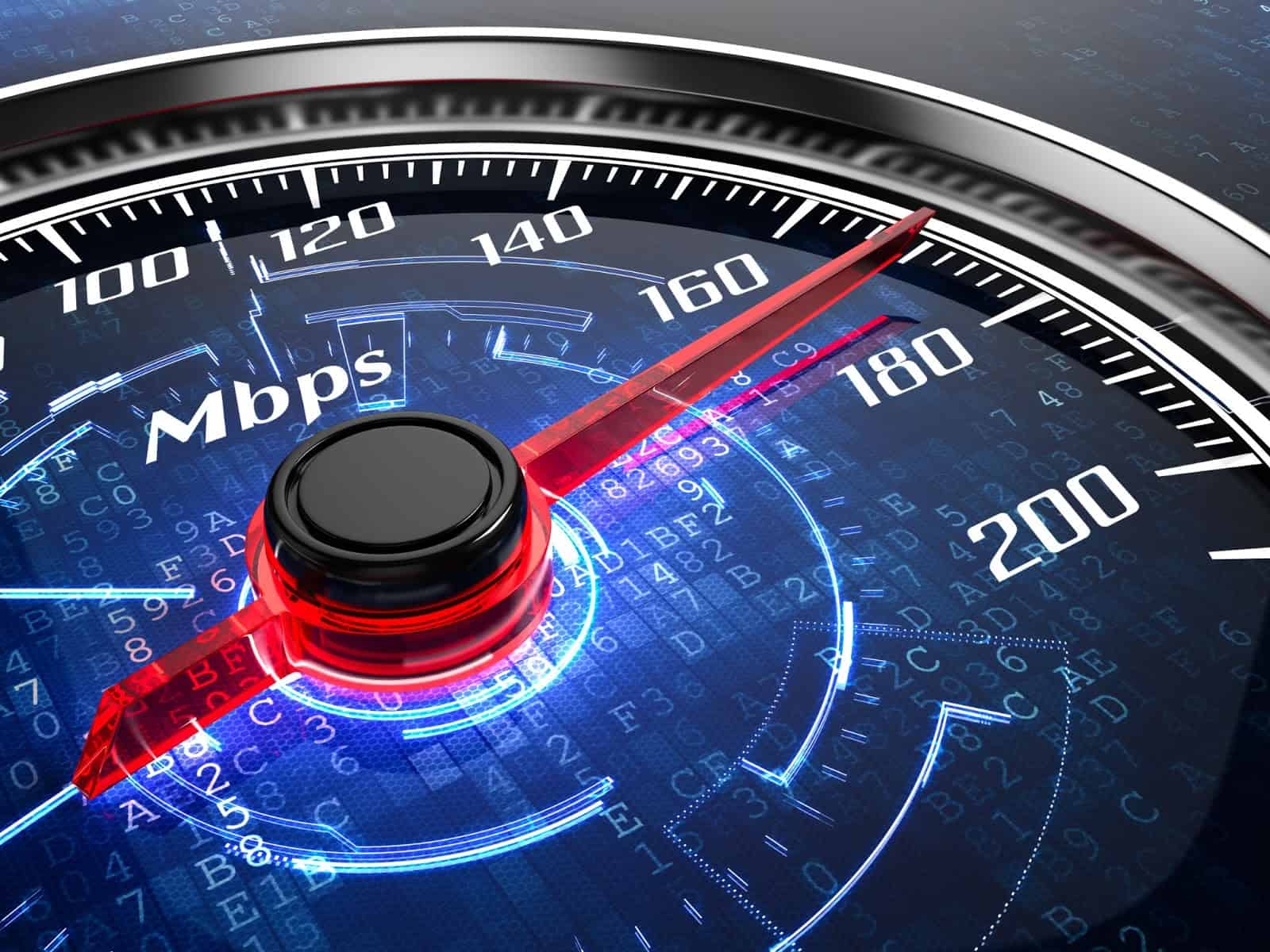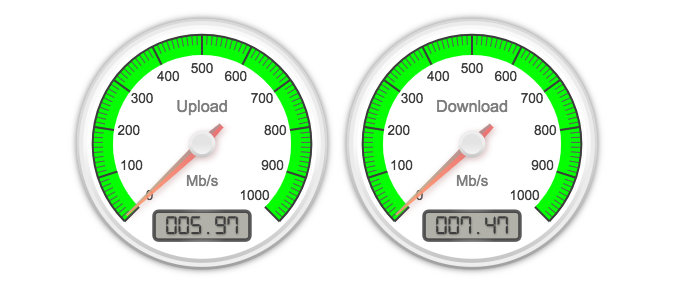Normal Range for Upload Vs Download Speed
Simply put, internet speeds in the 100–200 Mbps range are platonic for most households since they tin can handle common activities similar streaming and video conversation for two to five users at once. Nevertheless, several factors should too be considered — especially for home offices and gaming where upload capacity for files and reaction times are particularly important.
Along with upload speeds, latency, and your location, some other cistron to consider is your Wi-Fi network. The average Wi-Fi speed you experience around your home will generally exist anywhere from 20–l percent below the advertised download speed due to wireless interference and fade equally you move further from the router. With that said, it's important to choose a speed slightly faster than what you need to account for network slowdowns.
While each household volition accept their ain definition of what a skilful internet speed is based on their needs, hither are a few elementary guidelines on different speeds and what they tin can handle:
| Internet Speed | Users Supported | Speed Summary |
|---|---|---|
| 25 Mbps | 1-2 | Basic |
| 100 Mbps | 3-4 | Average |
| 200 Mbps | four-5 | Fast |
| 500 Mbps | 5+ | Very Fast |
| ane,000 Mbps | v+ | Gigabit |
To get a quick recommendation based on the number of users and devices in your dwelling, take a look at our bandwidth calculation tool. If you already have Wi-Fi and are having slower-than-normal speeds, endeavour troubleshooting your Wi-Fi, or consider learning how to extend your Wi-Fi network.
In this article, we help you make up one's mind how much net speed you demand based on how many cyberspace users are in your home and how they use the net.
Mbps stands for "Megabits per 2d." This is the standard measure out of "speed" or "bandwidth" on dwelling net connections. Information technology measures how many bits (units of digital information) tin be transferred each second. Y'all'll unremarkably see speeds ranging from 10–1,000 Mbps advertised for home cyberspace plans.
How Much Speed Exercise I Really Need?
Hither are some general download speed requirements based on everyday online activities:
- Check email and browse the web: 1-5 Mbps minimum
- Stream Hard disk content: 5-25 Mbps minimum
- Stream 4K content and play competitive online games: 40-100 Mbps minimum
- Stream 4K content, play competitive online games, and download very large files: 200 Mbps minimum
What Is a Good Internet Speed?

Any net connection above 25 Mbps is a good net speed. The FCC currently defines a "broadband" internet connexion as one that provides at to the lowest degree 25 Mbps for download speed and 3 Mbps for upload. This is a decent benchmark for the average family of three; still, larger households of 3 to five people should consider speeds closer to the 100–200 Mbps range.
In lodge to be a "expert" cyberspace speed, the connexion has to meet the needs of the household, which volition vary based on number of devices connected and how many people utilize the connection at one time.
The experience using an internet connection depends on several factors:
- How many devices are connected and in use simultaneously?
- How many people are streaming video from Netflix, YouTube, or another service?
- Are yous using your dwelling Wi-Fi for competitive online gaming?
- Do you frequently need to transport large files for piece of work?
- Practise you regularly stream 4K video, or do you mostly stick to simple online tasks?
- Practice you become frustrated easily if your game lags or your webpage takes a while to load?
As you tin see, good internet speed can mean something different for every household. For instance, if yous're using your home Wi-Fi for simply spider web browsing and email, you might feel that you have fast net with only ten Mbps.
On the other paw, someone who streams 4K video on multiple devices, plays video games online, and has smart home IoT devices, may non exist satisfied with even 100 Mbps. They should look at fiber options like those offered past AT&T Fiber internet or Borderland Communications FiberOptic which offers higher uploads speeds than other common connections like cablevision and DSL.
Information technology'south worth mentioning that the range of functioning you can get is somewhat relative to your location. Rural areas in states like California and fifty-fifty New York often have much lower speeds (around 25 Mbps) and fewer options, when compared to urban centers inside the state which typically have 100+ Mbps plans available, such as Los Angeles, San Diego, or Brooklyn.
What Is a Fast Net Speed?
By nearly definitions, anything in a higher place 100 Mbps is considered "fast." Once you start getting shut to 1 Gbps (ane,000 Mbps), the internet plan is chosen a "gigabit" service.
If you're wondering why anyone would ever need a ane Gbps or higher download or upload speed, the answer is pretty simple: most of us don't (though that may modify in the future). That said, these sorts of speeds may be worth information technology for techies, gamers, streamers, and large households.
What Is the Difference Between Upload and Download Speed?
If you don't know the difference betwixt upload and download speeds, here is a simple breakup:
- Download speed: how rapidly your internet connection can retrieve data from the cyberspace (web pages, video, cat photos, etc.)
- Upload speed: how chop-chop your internet connection tin can send data from your devices up to the internet (uploading video to YouTube, sending documents via email, etc.)
When you see the advertised speed of an cyberspace program, what you usually see is the download speed. The upload speed isn't visible at commencement, or it appears in a much smaller size at the bottom.
Download speed is much more than important for the average user since you just notice upload speed when trying to share large files. Information technology'south normal for your upload speed to be around 1 tenth your download speed. However, fiber internet users often have symmetrical (or identical) download and upload speeds.
How Fast is 25 Mbps?
A 25 Mbps plan tin can be referred to equally the "Goldilocks" of internet plans. It's neither too fast nor likewise dull. For a pocket-sized household of light cyberspace users, y'all won't suffer from frustrating lag or pay for bandwidth that you don't need.
Here are some things you lot can expect from 25 Mbps:
- Stream Netflix and YouTube at 1080p on one or two devices without buffering
- Play most online games without lag
- Almost zero look time for loading almost webpages
And so, is 25 Mbps fast?
For a small-scale household that isn't doing intense streaming on multiple devices or gaming at loftier-resolution, 25 Mbps is relatively fast. For larger households or for internet users that demand 4K resolution, 25 Mbps may even so not be enough. The biggest factor hither volition be the number of devices being used at a time. Well-nigh any household can get away with 25 Mbps equally long as the number of users/devices online at a time is limited. For case, three to iv people tin can stream in HD with a 25 Mbps connection, just anyone else trying to get online volition likely feel a tiresome connectedness.
Best Net Speeds for Streaming

Basic streaming doesn't require very much bandwidth. However, when y'all starting time to stream in 4K resolution or stream on many devices at in one case, you will need a much larger internet package.
How Much Net Speed Do I Demand for Netflix?
In general, streaming videos on platforms such as Netflix or YouTube TV requires 3-5 Mbps to stream in HD.
If you desire to stream in 4K Ultra HD, you will need a minimum of 25 Mbps. However, streaming even one video in 4K Hd may utilize upward all of your available bandwidth. For that reason, if you lot similar Hd video and you have more than than one device continued at a time, we recommend a speed of 50 Mbps or more.
For instance, say you have a 25 Mbps down connectedness speed. If the total capacity of your net connexion was a pie, each device on the network gets a "piece."
Your total potential speed is split across all of the devices connected to the network. So, a 25 Mbps plan may simply be providing ten-15 Mbps on Netflix — depending on how many devices are taking a "slice."
As well, using Wi-Fi will ever be slower than a hardwired connection. Trying to stream over Wi-Fi tin can produce less-than-stellar results.
Thankfully, there are a few things you can do to ensure that you lot're maximizing your chances of a trouble-free streaming experience:
- Connect your streaming devices to the router with an ethernet cable whenever possible.
- When streaming over Wi-Fi, position the streaming device as shut to the router as possible, with no physical barriers similar walls or furniture betwixt them. This will assist you lot achieve a more stable connectedness.
Use our bandwidth figurer to become an estimate of the speed you actually demand to stream on multiple devices at home.
Best Internet Speed for Gaming
Online gaming is one of the few activities that require a fast upload speed. This is because the actions that you perform in-game are uploaded to a server for other players to view and interact with.
How Much Cyberspace Speed Do I Need for Gaming?
Minimum net speed requirements for gaming are usually 4-8 Mbps if nobody else in the house is using upwardly your bandwidth. Unfortunately, slower internet plans such as these may not give you the upload speed you need for a consistently skilful feel.
If you're the only one at habitation, a 25 Mbps cyberspace plan is recommended for smooth gaming. However, speed isn't the merely thing that matters in gaming: ping and latency play a function likewise.
Ping and Latency: Does Information technology Matter?
Latency is a measurement of the corporeality of fourth dimension it takes for data to be transmitted from ane point to another. Ping is often used interchangeably to describe this, but in fact, a "ping" is but the act of hailing a certain receiver. Under this definition, latency is a measurement of how quickly you can "ping" the server you are trying to accomplish.
And then, is latency a real business organization when deciding which service provider to choose from?
Honestly, the bulk of users volition likely not exist impacted past latency. Latency is more than of an issue for satellite net users as it takes longer for data to travel and is more susceptible to interference than wired net connections (i.e. cable, DSL, and cobweb). Competitive gamers serious about getting the best connection will definitely want to await into minimizing this number past either upgrading to a cable or fiber internet connection or connecting their gaming device directly to their modem/router.
Mbps vs Gbps: What's the Difference?
Internet speeds are measured in "Megabits per second," ofttimes abbreviated as "Mbps." These commonly range anywhere from ane Mbps up to 1,000 Mbps.
- 1 Mbps: one Megabit per 2nd
- One Gbps: i Gigabit per second, or i one thousand Megabits. (1 Gbps is the maximum for most dwelling house internet plans, and so you will oftentimes come across fiber providers annunciate "gigabit service" or "gig speed.")
An average MP3 song in your iTunes ranges from 3 to five megabytes, whereas a 4K picture show or television receiver evidence tin be several gigabytes, then it's important to estimate the types of speeds you'll need accordingly.
Bits vs Bytes
The corporeality of information you utilise is measured in "bytes," while the speed you can motility data is measured in "bits." For case:
"The boilerplate cable internet plan has a download speed of 150 Megabits per 2d (Mbps), and a data cap of one,024 GigaBytes (GB)."
MB vs GB: What's the Divergence?
This is disruptive for non-techies, but to put it but:
- MB: MegaByte (a 1000000 bytes of information)
- GB: = GigaByte (a billion bytes of information)
You will likely run into the term GB used in conjunction with data caps, which some providers use to limit the amount of data you lot can consume. These can either be hard capped (service is not available after exceeding the stated amount) or soft-capped, significant you volition only feel slower speeds — and potentially, additional charges.
Why Does Internet Speed Vary Per Location?
You may notice a certain company offer fast speeds in the subdivision adjacent yours — simply to search your internet options and detect they can't provide the same speed for your street. This can be frustrating.
Regardless of which type of service you lot're interested in, your physical connection has to go somewhere fundamental before information technology tin can move on to the wider network that forms the courage of the net. For DSL and cable, this central location is the provider'due south office or joining node, and for fiber, a cardinal switch.
No thing the specifics, the concrete distance betwixt your habitation and these meeting points can take an impact on the speed of service a particular company is able to offer. Remember, though — just because one provider can only offer a certain speed, that doesn't necessarily mean all of them are limited in the same style.
If you live in an surface area where there are several services to choose from, check the speeds offered by other ISPs in your area before setting an install date.
How Can I Calculate My Upload and Download Speed?

If you already have existing service just aren't sure how fast it actually is, yous can find out using our speed test tool.
Substantially, this service works by sending test samples of data to various remote servers, the same manner y'all would when browsing the web.
Nosotros then display the average upload and download speeds of those private pieces of information, allowing you lot to get a expert idea of what yous're working with.
The Bottom Line: 25 Mbps Is the Minimum Speed for Modern Households
So how much speed do yous need? If you don't have time to dig into the details, but brand certain yous get a programme with at least 25 Mbps download speed. For virtually people, this is "skilful enough."
Withal, plans are constantly irresolute, sometimes offering faster speeds for lower prices. We recommend getting the fastest plan your preferred provider offers under $100 per month — especially since information technology's possible to get gigabit fiber internet for only $60-$70 per calendar month.
For more detailed recommendations based on your specific household size and number of devices, visit our net speed calculator.
Source: https://broadbandnow.com/guides/how-much-internet-speed-do-i-need
0 Response to "Normal Range for Upload Vs Download Speed"
Post a Comment